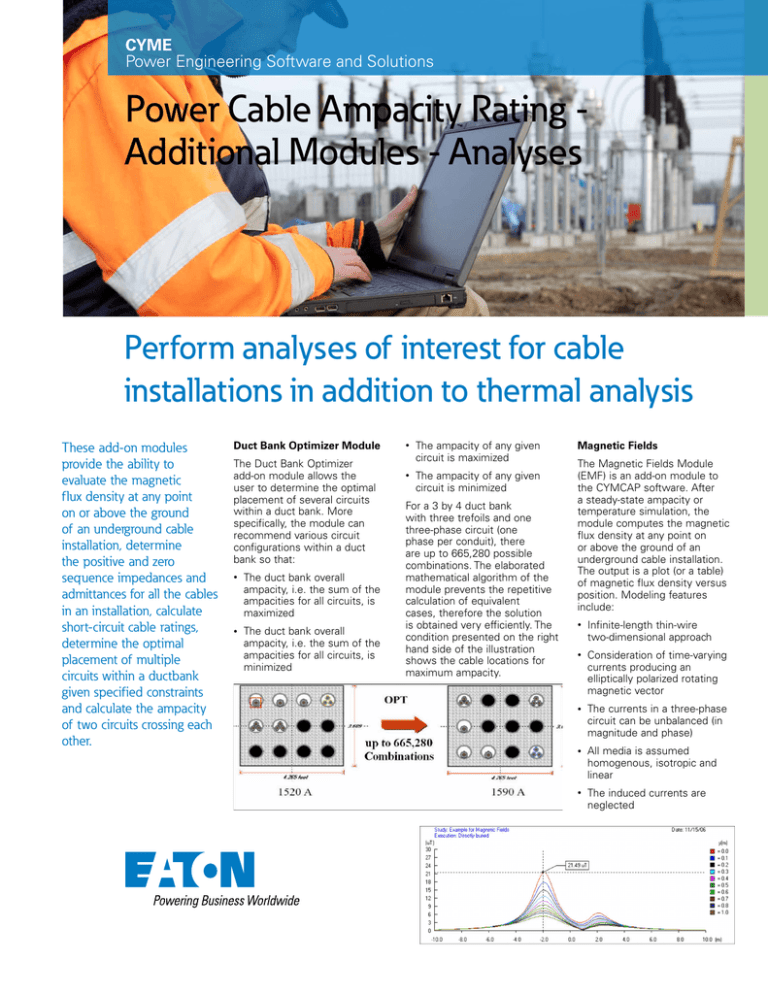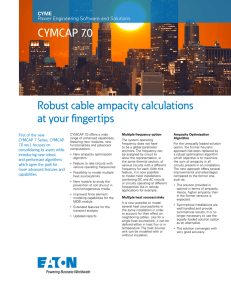
CYME
Power Engineering Software and Solutions
Power Cable Ampacity Rating Additional Modules - Analyses
Perform analyses of interest for cable
installations in addition to thermal analysis
These add-on modules
provide the ability to
evaluate the magnetic
flux density at any point
on or above the ground
of an underground cable
installation, determine
the positive and zero
sequence impedances and
admittances for all the cables
in an installation, calculate
short-circuit cable ratings,
determine the optimal
placement of multiple
circuits within a ductbank
given specified constraints
and calculate the ampacity
of two circuits crossing each
other.
Duct Bank Optimizer Module
The Duct Bank Optimizer
add-on module allows the
user to determine the optimal
placement of several circuits
within a duct bank. More
specifically, the module can
recommend various circuit
configurations within a duct
bank so that:
•
The duct bank overall
ampacity, i.e. the sum of the
ampacities for all circuits, is
maximized
•
The duct bank overall
ampacity, i.e. the sum of the
ampacities for all circuits, is
minimized
•
The ampacity of any given
circuit is maximized
•
The ampacity of any given
circuit is minimized
For a 3 by 4 duct bank
with three trefoils and one
three-phase circuit (one
phase per conduit), there
are up to 665,280 possible
combinations. The elaborated
mathematical algorithm of the
module prevents the repetitive
calculation of equivalent
cases, therefore the solution
is obtained very efficiently. The
condition presented on the right
hand side of the illustration
shows the cable locations for
maximum ampacity.
Magnetic Fields
The Magnetic Fields Module
(EMF) is an add-on module to
the CYMCAP software. After
a steady-state ampacity or
temperature simulation, the
module computes the magnetic
flux density at any point on
or above the ground of an
underground cable installation.
The output is a plot (or a table)
of magnetic flux density versus
position. Modeling features
include:
•
Infinite-length thin-wire
two-dimensional approach
•
Consideration of time-varying
currents producing an
elliptically polarized rotating
magnetic vector
•
The currents in a three-phase
circuit can be unbalanced (in
magnitude and phase)
•
All media is assumed
homogenous, isotropic and
linear
•
The induced currents are
neglected
Power Cable
Ampacity
Rating Additional
Modules Analyses
Perform analyses of interest
for cable installations in
addition to thermal analysis.
Cable Impedance Calculation
Short-Circuit Cable Rating
Circuits Crossing
The Cables Impedance
Calculation add-on module
(ZMat) calculates the electrical
parameters for cables necessary
for performing load flow and
short-circuit studies at the
power frequency (50/60 Hz).
The calculation of impedances
is performed after a steadystate ampacity or temperature
simulation has been successfully
completed. The final results are
the positive and zero sequence
impedances and admittances
for all the cables present in the
installation.
The Short-Circuit Cable
Rating (SCR) add-on module
is dedicated to the rating of
cables for short-circuit currents.
The implemented method is
based on the IEC Standard
60949© (1988) “Calculation of
thermally permissible shortcircuit currents, taking into
account non-adiabatic heating
effects”. The CYMCAP program
computes both adiabatic and
non-adiabatic ratings.
The Circuits Crossing (Xing)
add-on module allows the user
to determine the steady-state
ampacity of two circuits crossing
each other.
All impedance and admittance
matrices are displayed in
the report: starting from the
primitive matrices per section
per metallic component, the
bonding matrices, then the
phase and circuit matrices and
finally the resulting symmetrical
components matrices. The
following features are supported:
•
Computation of the sequence
impedances for all the cables
present in an installation
The module offers two
possibilities according to the
known input data:
•
Compute the maximum shortcircuit current that a cable
component can carry given
the short-circuit time together
with the initial and final
temperatures
•
Compute the final temperature
that a given cable component
will reach for a specified
short-circuit current, initial
temperature and time interval
Short-circuit ratings can be
computed for all metallic layers
supported in the CYMCAP
software:
•
Computation of the sequence
admittances for all cables
present in an installation
•
Multiple cables per phase are
supported
•
Conductor
•
Sheath
One or more neutrals can be
represented and are taken into
account in the calculations
•
Sheath Reinforcement
•
Concentric Neutral / Skid
Wires
•
Armour
•
•
Resistivity of the soil can be
changed
When two circuits cross each
other, each of them behaves as
a heat source for the other one.
The amount of generated heat,
the vertical distance between
the crossing circuits and the
crossing angle are the main
parameters that influence the
crossing rating. In the absence
of crossing calculations, the
general practice is to use the
conservative result where the
circuits are assumed to be
parallel. When the circuits are
parallel, the thermal interaction
is maximum. It goes to a
minimum when they cross
each other at a right angle.
The conservative approach
unnecessarily de-rates both
circuits. By using the Circuits
Crossing module, one can
achieve ratings up to 20% higher
than the conservative ampacities
that are obtained based on the
parallel installation scenario.
Modeling features include:
•
Modeling of two circuits
crossings each other in the
same installation
•
Circuits crossing directly
buried underground, in buried
ducts and in buried pipes
underground
•
Rating methodology as per the
IEC standard 60287-3-3©
Eaton
1000 Eaton Boulevard
Cleveland, OH 44122
United States
Eaton.com
CYME International T&D
1485 Roberval, Suite 104
St.Bruno, QC, Canada J3V 3P8
P: 450.461.3655 F: 450.461.0966
P: 800.361.3627 (Canada/USA)
CymeInfo@eaton.com
www.eaton.com/cyme
© 2015 Eaton All Rights Reserved
Printed in Canada
Publication No. BR 917029 EN
November 2014
Eaton is a registered trademark.
All other trademarks are property
of their respective owners.
Follow us on social media to get the
latest product and support information.



